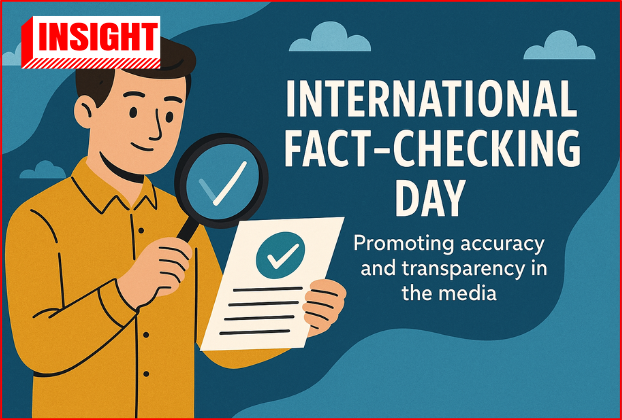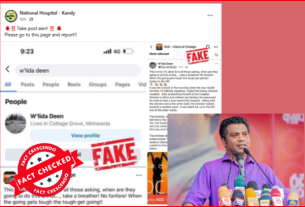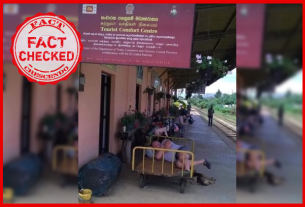Subscribe to our WhatsApp Channel
International Fact-Checking Day is celebrated on April 2nd every year. This commemoration is significant in combating the growing volume of false and misleading online content and helping the public realize that not everything they see online is true.
In particular, the importance of every citizen becoming a fact-checker has become even more evident at a time when the World Economic Forum’s 2025 Global Risks Report has ranked the threat posed by disinformation and fake news as a serious risk for the next two years.
The history of International Fact-Checking Day
Established by the International Fact-Checking Network (IFCN), this day is a part of a larger effort taken by fact-checking organizations worldwide to ensure that the truth of the information they provide is presented to audiences in every part of the globe.
Journalists, lecturers, politicians, governments, healthcare workers, advertisers, and even ordinary citizens must be held accountable for ensuring that the information they share is true and accurate.
Fact-checking is not only the responsibility of professional fact-checkers. With the belief that myths and disinformation must be addressed, the purpose of International Fact-Checking Day is to remind everyone that they have a responsibility to take action.
The beginning of International Fact-Checking Day
International Fact-Checking Day was introduced at the London School of Economics in 2014, and the day was officially created in 2016. April 2nd has been strategically chosen as the Fact Checking Date, as April Fool’s Day fall on April 1st, and the possibility of spreading false information will be heightened during these days.
The importance of International Fact-Checking Day
Misinformation is one of the biggest challenges that people around the world continue to face. Although the increased use of internet has made information more accessible, many people are tempted to read and believe unverified posts that are shared through social media networks, in the form of credible news. Therefore, fact checking has become more important than ever.
There are various fact checking companies and media outlets around the world that are focused on debunking myths and fake news that continue to spread all around the world. The purpose of celebrating this Fact Checking Day is to appreciate everyone who work tirelessly to present credible information to the society.
Why is International Fact Checking Day is important?
To promote truth and accuracy
International Fact Checking Day draws attention on the importance of verifying information before spreading it. In a world where false, misleading information spreads quickly through social media, fact checking reports help to ensure that only credible information are shared.
To protect individuals from harmful misinformation
Without fact checking, individuals can be tempted to believe misinformation that can be harmful to themselves or others. Therefore, International Fact-Checking Day highlights and promotes the importance of using verified news and information, and encourages people to verify the accuracy of suspicious news before sharing it with others.
Responsibily of media and government
By checking facts, fact checking organizations act as a tool to hold media outlets and government officials accountable for their statements and actions. By promoting fact checking at the international level, it encourages the transparency and the integrity in the distribution of information by those in power.
5 facts in International Fact Checking Day
Checking facts build up critical thinking skills
Fact-checking encourages individuals to think critically about the information they consume, helping to create more informed readers and listeners who are less likely to fall for fake news or misinformation.
The International Fact Checking Network (IFCN) was launched in 2015
Launched by the Poynter Institute, the IFCN serves as a forum for Fact checkers around the world, leading to the wide recognition of the International Fact Checking Day.
There are over 100 active fact checking organizations globally
The international fact checking network has established active fact checking units in more than 69 countries around the world, including our organization, Fact Crescendo.
Not all information can be verified
While fact-checking is essential, not all types of information can be verified. Fact-checkers typically focus on verifiable factual claims, not opinions or predictions.
Fact checking increases trust in journalism
Fact-checking helps increase public trust in the media. By holding journalists to high standards, they ensure they provide accurate and reliable information to the public.
How to do a basic fact check?
- Find the source of the original content.
- Visit the source’s personal page. Is background information shared on their factual information? Can the person be trusted?
- Is the source a real person?
- If not, the content is not reliable.
- If yes, is the content an expressed opinion? If so, try to find more factual information.
- Consider searching for other content on the same topic. Find out if the information has been verified by other users or well known groups. If the content comes from a trusted organization, the information is likely trustworthy.
Don’t be afraid to challenge your own ideas. You may learn something you never thought possible.
Also, keep an open mind and practice critical thinking skilss when reading online content.
Our team at Fact Crescendo is certified by the International Fact Finding Institute (IFCN)
Fact Crescendo Sri Lanka is a branch of the parent company Fact Crescendo and has also been able to establish branches in regional countries such as Myanmar, Bangladesh, Cambodia, and Afghanistan over the past few years.
Fact Crescendo is headquartered in India and we conduct fact-finding in a number of Indian languages, including Hindi, Tamil, Malayalam, Bangla, Marathi, Gujarati, Assamese, and Odia.
Our impartiality is the reason that our investigations are appreciated by many who value independent fact finding. Also, since 2018, the quality assurance has been obtained annually in accordance with the guidelines of the IFCN International Fact-Finding Network, as the prescribed guidelines are properly followed and, due to factors such as the impartiality and fairness of our fact-finding, the quality and transparency of our methodology, the transparency of our funding, openness and honesty, and our policy of revealing only the truth.
We receive requests for fact-checking from users on social media, and we only investigate those that can be independently verified.
We are the only Sri Lankan third party fact checking team authorized to conduct fact checking recommended by Facebook.
Accordingly, we investigate false, altered photos or videos, partially false, news that may mislead the reader due to the lack of complete information (missing context), and misleading social media posts published from a satirical angle.
Although Facebook has been rated to prevent the spread of misinformation, there is still room for appeal and removal. More information on this here.
But we do not have the authority to block or remove any Facebook post, page or account, under any circumstances. Through ratings, readers who see fake posts are made aware of those posts and the sharing of those posts among people are also limited. Here you can refer to the Facebook’s explanation on this.
We, the Fact crescendo team, have been verified signatories of the IFCN Code of Principles since 2018.
We are also certified as an IFCN fact-checking organization, at WhatsApp.
Join us to learn more about our investigative fact findings.
Facebook | Twitter | Instagram | Google News | TikTok| WhatsApp

Title:The importance of International Fact Checking Day!
Written By: Fact Crescendo TeamResult: Insight






